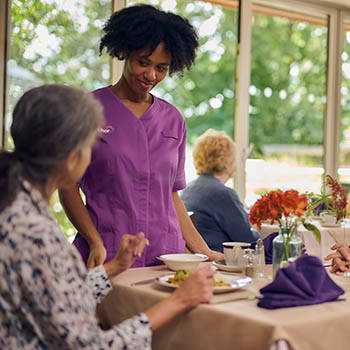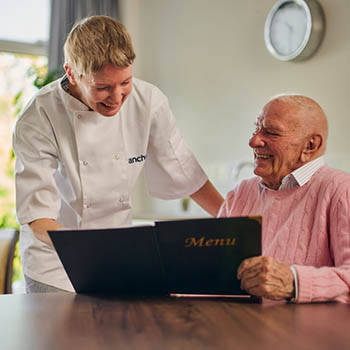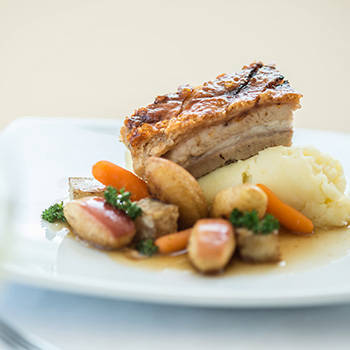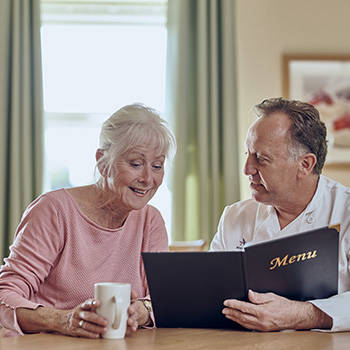- Home
- Care homes
- Catering and making the most of mealtimes
Catering and making the most of mealtimes
Mealtimes are an important part of daily life in Anchor care homes.
We pride ourselves on the quality of our catering and the range of choice available to residents daily.
We promote individual wellbeing through a positive and enjoyable dining experience in pleasant settings and support residents to eat and drink so they are well-hydrated and well-nourished.
Fresh, seasonal cooking by highly trained chefs
 All our care homes offer freshly cooked, appetising and nutritionally balanced meals with a different seasonal choice available every day. Our professional chefs use fresh ingredients to prepare a range of delicious, wholesome meals in our care home kitchens to be enjoyed throughout the day.
All our care homes offer freshly cooked, appetising and nutritionally balanced meals with a different seasonal choice available every day. Our professional chefs use fresh ingredients to prepare a range of delicious, wholesome meals in our care home kitchens to be enjoyed throughout the day.
Our care home catering teams will consult with you on a regular basis to ensure we understand your nutritional requirements and food preferences. Our experienced chefs carefully plan four-weekly menu cycles, which are changed twice a year, to ensure you enjoy a variety of delicious dishes every day of the week.
The preferences of residents are always taken into account, which means classic meals often feature alongside traditional regional cuisine on our menus, and many of our homes also have a signature dish chosen collaboratively by the catering team and residents. Many of our care homes hold monthly themed food days and provide opportunities for residents to be involved in the preparation of meals if they wish, allowing them to feel part of the running of their home and carry out familiar activities.
Each care home has a Food Promise, a unique statement about the quality of catering and type of food choices the residents enjoy, which we proudly promote throughout the home.
Download a sample menu from an Anchor care home here
Enjoying mealtimes
Staff in our care homes are committed to making mealtimes a sociable and enjoyable part of each day.
 Visitors are welcome at any time and, if they wish, they can join you at mealtimes.
Visitors are welcome at any time and, if they wish, they can join you at mealtimes.
Anchor understands mealtimes often provide a positive structure to the day around which other plans, such as trips out, are made. Living with Anchor, you can expect:
- Your day starts with a choice of cereals, toast, cooked or continental breakfast
- At mid-morning you’ll be offered tea, coffee and a snack such as homemade biscuits
- A range of hot and cold dishes are on offer at lunchtime
- Afternoon tea is often served with homemade cakes, pastries and scones
- In the evening you can choose from a wide selection of hot and cold meals
- Evening and night time snacks are also available if you’d like them
Anchor also understand the importance of ambience and decorate the dining areas in our care homes in colours that stimulate the appetite and create an enjoyable atmosphere.
Nutrition and hydration stations
Our care homes also feature nutrition and hydration stations in the communal areas. These discreet displays are stocked with a variety of snacks and soft drinks to enable residents to snack all day independently and encourage them to remain hydrated and well fed at all times.
 Dietary and medical conditions
Dietary and medical conditions
Whatever your dietary needs, we’ll do our best to cater for them. If you’re vegetarian or vegan, on a medically-advised diet to manage a health condition, or have food intolerances or allergies, just let your care home manager know and it will be taken into consideration when planning our menus.
Religious restrictions and cultural tastes
We’re also happy to cater for religious diets and specific cultural cuisines. Before you move in, we’ll discuss with you your needs and do our best to put together menus that meet your tastes and preferences.
Beverages
We serve a range of hot beverages including tea and coffee with all our meals and throughout the day. Cold drinks are also available and fresh water is placed in your bedroom every day.
As with all aspects of our care, our staff respect your individual preferences. Their aim is to boost your appetite and enable you to enjoy your meals, which will help you maintain a healthy lifestyle.
 What food means to us
What food means to us
At Anchor we take great pride in the range of high quality, seasonally focused, and nutritionally balanced meals our chefs make available to residents on a daily basis.
The meals served across our care homes are created not just with a deep understanding of each resident’s specific needs, but with an awareness of important personal role food plays in all our lives.
After all, we all know that when it comes to food, individual tastes and preferences are everything. That’s why in all our homes, our catering teams make an effort to get out of the kitchen and speak to the people they cook for on a daily basis. We all have strong memories associated with certain recipes, foods, specific meals, and for our chefs, it’s important that the food they serve isn’t anonymous.
Every plate tells a story
By engaging with residents, finding out about their likes and dislikes, and discovering more and more about the people they cook for, Anchor care home chefs make sure that every meal they serve comes with a personal touch.
Chef of the Year competition
The Anchor Chef of the Year competition is a chance for chefs from across the organisation to show off the culinary excellence and flair they deliver to our residents on a daily basis, and be rewarded and recognised by Anchor for it.
Find out moreBrowse our care home locations
This website uses cookies which track activity so that you get the best possible experience. By continuing to use this website we will assume you are happy and cookies will be set. You can change your cookie settings at any time.

